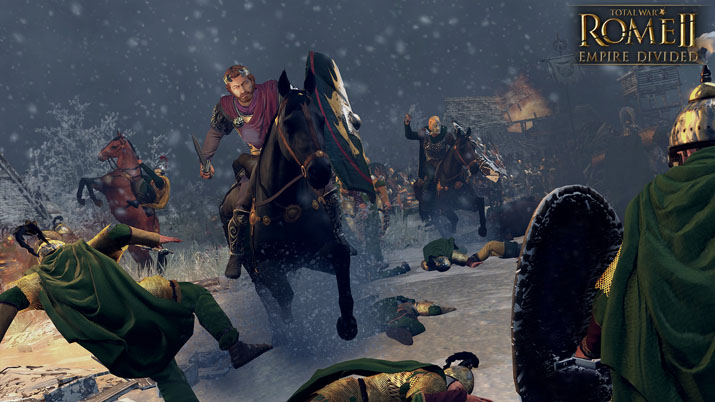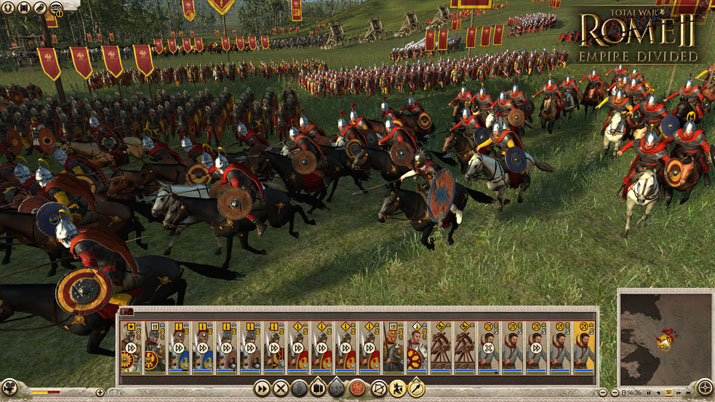If you’ve played one Total War you’ve played them all, right? Well, not exactly. There’s enough content in its DLCs to equate the value of a full release, but for a lower price. Rome II has had a multitude of DLC’s itself, and justifiably so – the empire spanned a continent or three over the course of a millennium or two. Empire Divided focuses on a chaotic third century, when the empire was at war with itself.
Come for the history, stay for the addiction.
The extra history is the reason you might want to pick up Total War DLCs. In my experience playing Wrath of Sparta for example, other than the Greek font found on the map and the more (annoying) island-hopping style of combat, what I noticed most was my advisor telling me historical facts about cities I clicked on.
If you’re a history buff, that sort of thing will draw you in. On my first playthrough of Empire Divided, I decided to stay faithful to History and choose the Romans. No, not the Romans in Palmyra under Queen Zenobia, and not the Gallic Romans, but the Romans led by the guy who actually put Rome back on track: Aurelian.
Aurelian did not disappoint.

Here’s where the mechanics of the game come in. Aurelian rules with an iron fist, and that means, yes, steamrolling your enemies (a little too easily, but whoever complained about winning?). Since Total War is about history but your choices are free, it means the series needs to tell history through mechanics, and this DLC does a nice job of it.
Empire Divided adds in little snippets of “choices matter” mechanics, giving a legendary feel to your main character while adding to the mystic religious atmosphere of these uncertain times. The addition of cults is also impactful in this aspect. Cults improve sanitation, which helps you combat problems with plague in a thematically consistent way. Again, going along with history, I tried to salvage the empire with the use of Christianity, and that’s when I had a pleasantly unpleasant surprise. Cults are free for you to build and upgrade, but fill your whole empire with level 4 Christians and you will find yourself starving from their food penalty. To make it worse, the higher you upgrade, the more it costs to get rid of them, and Christians also cause disorder if there are other cults around.
The consequence is positive: an atmospheric feel for a distinct period of History. Plus, the added tech trees for Generals lends to much more satisfying careers with units growing nearly invincible should they survive long enough. But in the end, it isn’t these aspects that will have you playing for hours or days or weeks without sleep (please, someone help me – my wife left me a month in.), it’s just the fact that you’re playing good old addicting Total War.
And then are the annoying niggles.
Total War also has a habit of always doing the same annoying things, over and over, game after game, and these add up to your overall feeling of frustration. Things such as an overly sensitive cursor when attempting to blockade a port. You rotate the camera back and forth, trying to get the city name out of the way, but there’s just a one pixel spot where you click and… nope, you clicked to attack by land, and your army is taking the eight-turn path around the sea instead of crossing it in one.
Rome II also always struggled with civil war mechanics. In the original release, you would spend hours building your empire and then, suddenly, every other province belongs to your overpowered enemy. Yes, it’s designed to keep us playing, because winning a Total War campaign has always had the anticlimactic feel of “Oh no, what am I doing with my life? I haven’t eaten in days!” But the civil war event has the opposite effect of making you punch through your monitor and never playing again.
In this DLC, civil war has been toned down to secession. Instead of random patches of your empire being annoyingly taken away, secession takes away a regional chunk. This is a lot more tolerable, until your secession immunity runs out while you’re chasing the last rebel army around the same hill turn after turn (another annoying Total War quirk) and you’ve almost got your revenge when another chunk of your empire secedes. There’s no way I’m not reloading from the last turn to veto those shenanigans...
The added mechanic of banditry is also a bit of a write-off. You can build new city structures to combat banditry, but they aren’t all that effective for the amount of work and research they require (the civil tech tree is now basically all about unlocking buildings, which could be interesting but who has the time?). In the end, you can pretty much ignore bandits and cut your losses when they steal your income. Every now and then.

It’s called Rome II so you pretty much have to play as Rome.
Finally, the DLCs flesh out the main races well, but tend to leave others hanging. Actually, even that might not be totally true – in Wrath of Sparta, the Greeks’ voices were clearly the Romans’ with all mentions of Rome jarringly edited out of their battle cries (I still love that posh British accent though). In my second campaign, I played as the steppe nomads, wanting to see what hordes of cavalry swarming over the plains would be like. But they kept referencing Norse gods and stuff, and that kind of inconsistency really ruins the feel.
The units received a little more attention than the voice acting – there were indeed a lot of cavalry units that can’t stand up to infantry armies in early game. Oh, plus you start out dirt poor with three tiny villages stretched across a million miles. It doesn’t make sense; steppe people are supposed to be able to pillage every society they come across with well-aimed arrows, but these guys run out of steam before the real fight even starts. The race and their campaign just don’t feel as well fleshed out as the mainstream Romans and Greeks. Turns out being a shepherd is a crappy life.
The Verdict
The Rome II: Empire Divided DLC is the standard Total War that we all know and love. There are no huge surprises and for the most part, mechanics added do a good job at immersing you into the Third Century and a Roman Empire fallen into chaos. Banditry isn’t all that noteworthy but Cults are fun and thematic. In sum, if you can’t get enough of Total War give this one a try.


